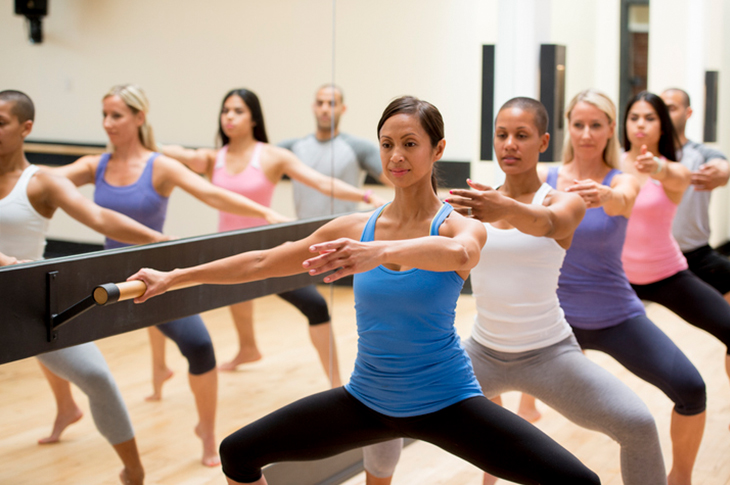Barre classes may do great things for your glutes, thighs, and core, but if you really want to be strong like a ballerina, consider a ballet workout. This total body exercise doesn’t just strengthen and lengthen muscles; it boasts some decided fringe benefits, like better posture, balance, and confidence, says Victoria Marr, director and co-founder of .
What is a ballet workout, and how does it compare to ? Read on to learn if this new spin on ballet is right for you.
What is a ballet workout?
“Ballet [workouts] take you through the entire journey of a ballet class,” says Chris Vo, director of programming, group fitness at and Equinox Media. But with a twist. In addition to plies, arabesques, and other classic moves, a typical ballet workout might include to tone the arms and back or for core strength. Either way, the result is a gentle cardio workout that sculpts, tones, and leaves you feeling light, flexible, and more graceful.
A mind-body workout
Ballet-focused classes aren’t just about building a better body. “Dance can lead to a long list of benefits,” says Vo. In addition to improved flexibility, coordination, and balance, dance may also reduce stress and depression, he says. Escaping to the world of dance may also help you become more mindful, adds Marr. “Mentally, you absolutely have to focus for that 30 to 40 minutes and block out any other stresses and distractions,” she explains. Research backs up her theory. For example, one recent found that dance students reported greater mindfulness and life satisfaction than students in other disciplines.
How do ballet workouts differ from barre classes?
On the surface, ballet and barre workouts may sound like the same thing, but there are some subtle—and not-so-subtle—distinctions. Here are the main ways they differ from one another.
Coordination and rhythm. “A good barre workout will work on coordination and rhythm but focuses on the more basic ballet steps,” says Marr. “[However], there is even more of an opportunity to advance the work on your coordination and rhythm once you leave the barre as you start to work with a bigger vocabulary of movement and build longer dance sequences.”
Upper body strength. Want ballerina arms? Then book a ballet class. While barre work can do magic for your lower body, it doesn’t always target the back and arms like sashaying across the floor with arms stretched outward or overhead does.
Cardiovascular endurance. “There is more of an option for larger range, dynamic movements off the barre,” says Marr. Plus, moving your arms and legs simultaneously really gets your heart pumping! Ballet is so effective for heart health that one recent found that regular moderate-intensity dancing reduced a person’s risk of dying from heart disease by 46 percent.
Perceived effort. “They both can be strenuous in different ways, but when you get lost in the artistry and the theatrical aspect of a ballet class, somehow one’s perceived exertion is much less,” says Vo.
The fun factor. “Barre workouts tend to feel like workouts, [and are] usually focused on smaller range of motion, high repetition, and light resistance exercises,” says Vo. By contrast, the jumps, leaps, and turns of a ballet class make you feel like, well, a dancer.
If you’re torn between the two, the good news is you don’t have to choose one over the other. “Both have their place and complement each other brilliantly,” says Marr.
But if you’re still not convinced that ballet is really exercise, consider the results of a recent . When researchers reviewed the results of 28 studies, they found that dance was more effective than traditional exercise for improving flexibility and balance and reducing BMI, body fat, and triglycerides. And it was equally as beneficial as exercise for cardiovascular health. So go ahead and dance your heart out!
The post appeared first on .




